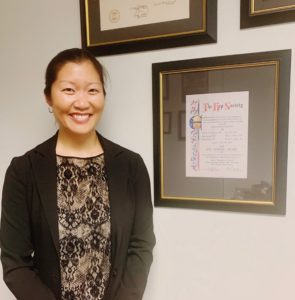
In March, the Hip Society presented the 2019 Otto Aufranc Award to Antonia Chen, MD, MBA and her colleagues, honoring their research on opioid usage. Dr. Chen is the senior author of the award-winning paper, “Cluster-Randomized Trial of Opiate-Sparing Analgesia after Discharge from Elective Hip Surgery.”
Established in 1968, the Hip Society aims to advance the knowledge and treatment of hip disorders to improve the lives of patients. The Otto Aufranc Award honors outstanding contributions and important advances in the field of orthopaedics.
As an orthopaedic surgeon and researcher, Dr. Chen’s research touches on many dimensions of clinical outcomes following total hip and knee replacements. She studies infection and arthrofibrosis after total joint replacements, the impact of “pre-habilitation” activity prior to joint replacement, and opioid use following hip and knee replacements.

Dr. Chen’s work on opioid usage began while she was at the Rothman Institute. She was later drawn to Brigham Health by the potential to conduct research that could help advance the Department of Orthopaedic Surgery and improve outcomes for patients. “Coming to the Brigham represented a huge opportunity to build something new at a world-class institution,” she says.
The study that the won 2019 Otto Aufranc Award explored whether a scheduled, multimodal approach to pain management—using drugs that target distinct, complementary pain pathways—can reduce the number of opioids needed at discharge after total hip replacement to achieve pain control for patients.
Dr. Chen and her colleagues designed the study to have three components:
- Patients were prescribed non-opiate medications on a fixed schedule (acetaminophen, gabapentin, meloxicam and omeprazole) with a minimal two-day opiate supply (10 tablets each of oxycodone and tramadol).
- Patients were prescribed the same scheduled-dose regimen, but with a conventional two-week supply of opiates (60 tablets each of oxycodone and tramadol).
- Patients were prescribed acetaminophen as needed in addition to a two-week supply of opiates (60 tablets each of oxycodone and tramadol).
Clusters of surgeons involved in the study rotated between using each of these interventions as “standard of care” for patients during a four-week period.
The study showed that patients who received the first component with the least amount of narcotics reported having the least amount of pain, the greatest satisfaction and the least amount of side effects.
“We were pleasantly surprised to see these results,” says Dr. Chen. “We think that the multimodal approach on a schedule helps patients stay ahead of the pain. They also report sleeping better and having fewer opioid-related side effects.”
Dr. Chen adds, “Perhaps we need to consider that a little pain can be okay after surgery and using less narcotics can lead to a better recovery. We don’t want our patients to expect to take many narcotics after surgery, and then pay for it with side effects.”
The aspect of Dr. Chen’s study that she finds most exciting is its potential to change the way opioids are prescribed after major surgical cases, such as total joint replacement.
“Most studies are retrospective, but this was a prospective study with a version of randomization. It’s a potentially practice-changing project,” says Dr. Chen. “This is a relatively simple change that could potentially improve the way we practice medicine.”
“I am very proud of Dr. Antonia Chen for winning this coveted award in the field of joint arthroplasty,” says James Kang, MD, Chair of the Department of Orthopaedic Surgery at Brigham Health. The Hip Society gives awards to the most important and groundbreaking research teams in the world. I know that our entire Orthopaedic team will continue to lead cutting-edge research with more accolades to come.”